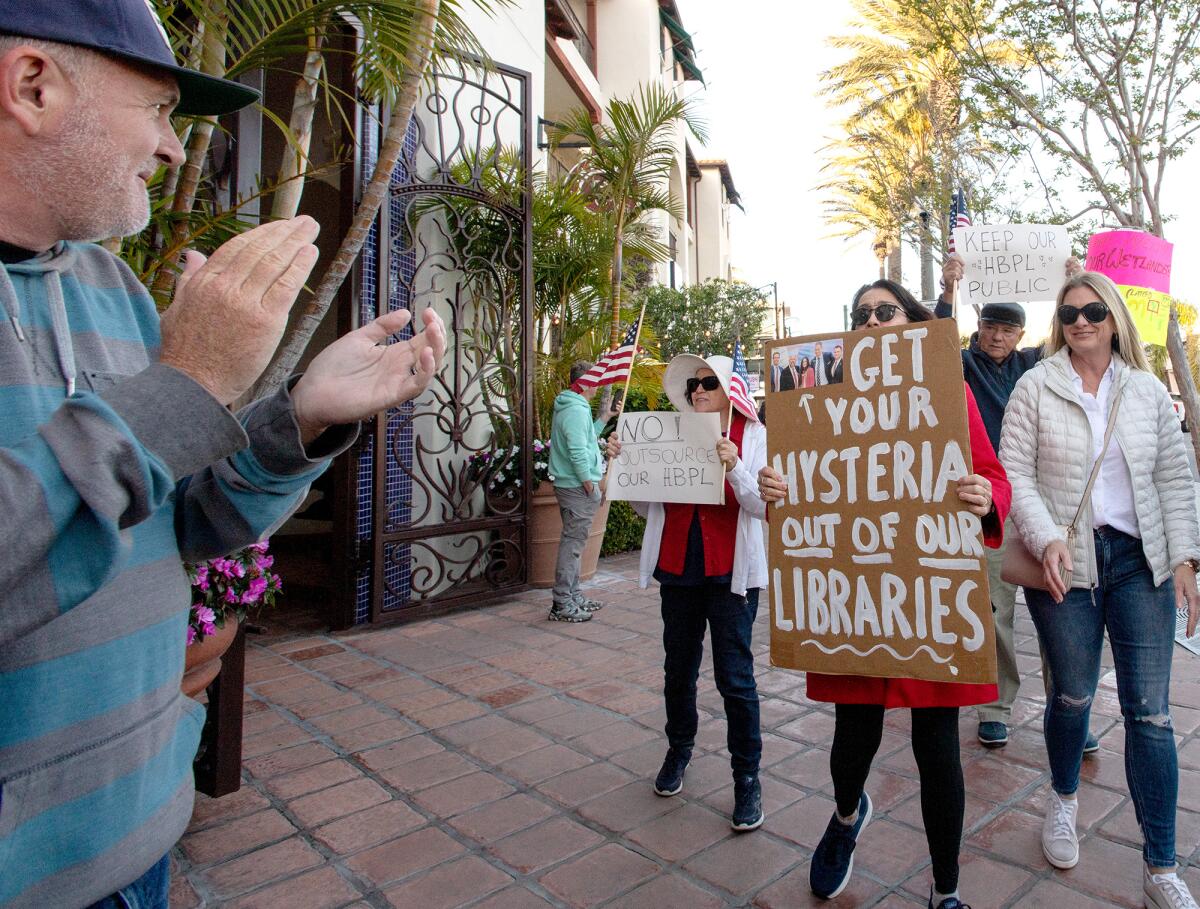Apodaca: Huntington Beach Library pros must not be usurped by City Council

- Share via
The precise moment of birth for public libraries in the U.S. is open for debate.
Considerable credit is often given to Benjamin Franklin. Books were relatively scarce in Colonial America, so Franklin and other well-heeled contemporaries, seeking access to more titles, pooled their resources and founded a membership-funded library. After the Revolution, he donated a collection of books to a Massachusetts town, leading to what some believe was the nation’s first public library.
Others give that designation to the first totally tax-supported library, which was established in Peterborough, New Hampshire, in 1833, whereas the Darby Free Library in Pennsylvania, founded as a subscription library in 1743, claims to be the oldest U.S. library in continuous service.
However we choose to mark the foundational moment for public libraries, it’s clear that from the earliest days in our nation’s history, great value was placed on making a wide variety of books available to all comers. That core belief has served us well, even as public libraries have evolved and solidified their place as exemplars of our democratic ideals and robust centerpieces of civic life.
I’ll come back to this point, but first let’s examine a little more historical context.
In our nation’s younger days, men from elite families often saw it as their mission to bring education to the masses through the library movement, while wealthy women typically served as volunteers. Those elite underpinnings began to change, particularly after the 1876 founding of the American Library Assn., the first and largest professional library organization in the world.
Over the years, educational and professional standards for library workers were developed and systems were designed to improve operations. The first library school, at Columbia University, was founded. Women began taking bigger roles. Libraries started appearing in smaller towns, rural destinations and harder-to-access areas. They transformed into indispensable community hubs.
Initially, much of this expansion was made possible by one man, industrialist Andrew Carnegie, who funded thousands of public libraries. But as the 20th century dawned, the philanthropic model was increasingly replaced by a public funding model, further enabling a corps of educated, passionate librarians to fan out across the country, improving access to books through the establishment of central libraries and small branches in previously underserved neighborhoods.
There were some darker aspects of this growth. Some libraries were segregated. And some were complicit in censorship.
By the 1950s, however, the ALA had taken a strong anti-censorship stand, and for the most part modern public libraries have striven to make their collections as broad and diverse as possible. In communities across the country, these institutions — funded primarily by the people, for the people — stand as stewards of free thought and expression.
What could be more American than that?
That’s a question I would like to put to four members of the Huntington Beach City Council, who appear intent on returning to a time when censorship and avoidance of diverse viewpoints often went unchecked.
These council members, who constitute a majority on the seven-member council, have led an effort that would result in bans or restrictions on certain books they deem objectionable, undoubtedly those with LGBTQ+ or racial themes. They plan to establish a committee of political appointees that would have the final say on which titles are included in the city’s public library collection, overriding decisions made by trained librarians and the desires of many city residents.
That’s bad enough, but there’s more. Now these council members say they are considering handing over operational control of the public library system to a private, for-profit company.
Apparently some months ago Huntington Beach was approached by its former mayor, Mike Posey, who now works for Library Systems & Services, which bills itself as the nation’s only company focused on operating public libraries.
Library Systems has worked aggressively to win contracts to run public libraries across country, including in a few Southern California cities, in part by promising operational efficiencies. But controversy has followed it in some communities, where critics complain that the company’s first loyalty is to its investors, and contend that it cuts costs by decimating staff and baring library shelves.
Notably, Fullerton decided to pass on a suggestion to turn library operations over to the company.
Huntington Beach’s current mayor, Gracey Van Der Mark, who has spearheaded the effort to establish the library review committee, said the city should consider a proposal from Library Systems because of potential cost savings.
But many city residents see this as yet another attempt by Van Der Mark and other council members to wrest control over the public library and its staff because of their personal objections to some types of books.
Outsourcing government operations to the private sector can be appropriate in certain circumstances. But in the case of the Huntington Beach public library, alarmed residents can only shake their heads in dismay at yet another attempt to fix something that isn’t broken — a well-run, beloved institution that brings value to the community it serves.
It’s long past time for the Huntington Beach City Council to listen to the fervent pleas of their constituents, put their backward-looking agenda and extreme ideologies aside, and end the assault on the public library. History will be watching.
All the latest on Orange County from Orange County.
Get our free TimesOC newsletter.
You may occasionally receive promotional content from the Daily Pilot.





